Sadly Timely
The Must-See Revival of Parade
BY CHRISTOPHER BYRNE
Rising antisemitic rhetoric, a debased and craven media fanning the flames of bigotry to attract readership, political corruption, and zealots taking the law into their own hands to exact a kind of revenge. If that sounds like our current climate in the U.S., sadly that’s very often the case. And yet, it’s nothing new.
Our current situation is a heartbreaking backdrop to the magnificent revival of Parade now on Broadway.
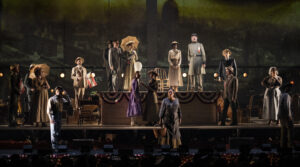
The Jason Robert Brown (score)and Alfred Uhry (book) musical, first seen at Lincoln Center in 1998, is now in a limited run at the Jacobs Theatre on Broadway, in a can’t miss, gorgeous, and profoundly moving production, that is simply perfect down to the smallest detail.
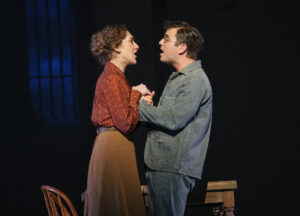
The musical tells the story of Leo Frank and his wife Lucille, Jews living in Georgia in the first decades of the 20th century. Leo is the manager of a pencil-making plant, and he is accused and convicted of the 1913 murder of Mary Phagan, without any real proof. Frank is prosecuted by lawyer Hugh Dorsey, a man with political aspirations who knows how to fan the flames of circumstantial evidence and play on the hatred of the people to secure the much-needed conviction, no matter what. He makes deals to get criminals like Jim Conley to get them to lie on the stand. Lucille, however, ultimately convinces Governor Slaton that the conviction is questionable, that Conley has suborned perjury, and Slaton commutes Leo’s sentence to life. Two years after he’s conviction in 1915, an angry mob kidnaps Leo from the prison and lynches him in Marietta, where Phagan was murdered.
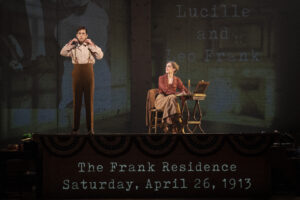
Michael Arden’s inspired direction places the main action on an elevated platform center stage while much of the town swirls around them below. It has the scope and scale of a grand opera and puts the focus on the characters and their inner lives. Brown’s score (He did the orchestrations as well.) is glorious in its complexity and emotional power, and it’s sung by a phenomenal cast. (More on that in a moment.)
Every detail of this production is precisely calibrated for the most dramatic impact. Dane Laffrey’s set, as noted, ensures that focus is always exactly where it needs to be. The limited color palette of Susan Hilferty’s costumes is juxtaposed against the striking colors of the American bunting that surrounds the stage and the intrusive red of the Confederate flags, that stands out and is, at times, gasp inducing in its impact. Heather Gilbert’s lighting also uses color deftly, and Jon Weston’s sound design sets a new, high standard for musicals.
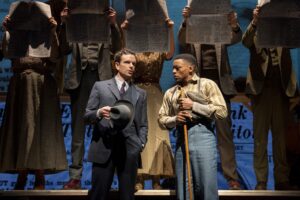
All of this provides the framework in which the performances can soar. The demands of Brown’s score require extraordinary singers, and this company is made up of nothing else. The caliber of singing from the ensemble to the principals would not be out of place on stage at the Met. Simply listening is a sublime and powerful experience.
Ben Platt as Leo Frank has never sounded better. It’s remarkable to hear how his voice has gown and matured in the short years since Dear Evan Hansen made him a Broadway star. He imbues the role with depth and humanity that subtly but unmistakably drives home the injustice of what has happened to him and the toll blind hatred takes on marginalized communities. Micaela Diamond as Lucille gives a star-making performance. The ferocity of her focus is complemented by the glories of her voice. It is not an easy role to sing. Brown has written a role that requires a singer to move through ever part of her range. Diamond does it, apparently, effortlessly, and the result is thrilling…in the literal sense. In her commanding presence and exceptional technique, Diamond claims the stage, and Lucille emerges as a powerful woman motivated by a love and righteousness. Diamond and Platt are very well matched.
The rest of the cast is superlative as well. Alex Joseph Grayson plays Conley with force and passion, particularly in the number “Feel the Rain Fall.” Conley is the only character who is unrepentant about his role in Leo’s conviction, and some contemporary theories suggest that it was actually Conley who killed Mary Phagan.
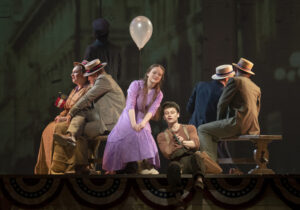
Paul Alexander Nolan is creepily marvelous as Dorsey, and Sean Allan Krill is terrific as Slaton. As is the rest of the company. In smaller, yet beautifully rendered performances, all of which are essential to creating the harrowing world that surrounds the Franks. Notably, Erin Rose Doyle as Mary Phagan, Jake Pedersen as Frankie Epps, another character recruited by Dorsey to lie under oath, Eddie Cooper, an initial suspect Conley targeted because he was black. (Conley needs a quick conviction, and Jew or black man was immaterial to him as long as he could stir the mob’s hatred to get a guilty verdict.)
It’s beyond disquieting that this story from more than a century ago has so much relevance to our world today. And yet, when so beautifully presented and realized in this production, although it’s a tragedy it is a testament to the power of love and conviction about what is right and the hope for justice that moves us all so deeply.
Parade
Bernard B. Jacobs Theatre
242 West 45th Street
Tues, Thurs 7 p.m.; Weds, Fri, Sat 8 p.m.; Weds, Sat 2 p.m.; Sun 3 p.m.
Tickets from $74 at Telecharge
2 hours, 30 mins, 1 intermission
Production photos by Joan Marcus
Published March 22, 2023









More Stories
Broadway Review: Art
Fall Arts Preview: Emus, Foxes and Eric Clapton, Too
Diane DiMassa Book Event September 25